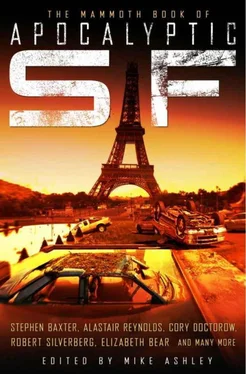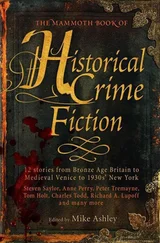“Cal had a radio. I tried to copy what he said, but the plastic made him hard to hear. He tramped down to the water, stooping to pick up rocks and drop them in his sample bucket. ‘Nothing green,’ I heard him say. ‘Nothing moving.’ He looked at the smoking volcano behind him and the blood-colored sea ahead. ‘Nothing anywhere.’
“Pepe was begging him to come back, but he muttered something I couldn’t make out and stumbled on over the frozen lava, down to a muddy little stream. Squatting there at the edge of it, he scraped up something for his bucket. We saw him double up with a coughing fit, but he got back to his feet and waded on down the beach, into a surf that was foaming pink.
“Pepe called again, warning him to come back. He waved a sample bottle. ‘Our best chance.’ His voice was a strangled croak, but I got a few words. ‘If anything survived in the sea. I hope-”
“Hope. Choking on that last word, he tried to get his breath and failed. He lost the radio and his bucket and stumbled a few yards toward us before he tripped and fell. The oxygen bottle floated away. We saw him grabbing for it, but the next wave took it out of his reach.”
“You left him there?” Dian’s voice rose sharply. “Left him to die?”
“We left him dead. Pepe wanted to help him, but he’d gone too far. His oxygen gone, the air had killed him.”
“Air?”
“Bad air.” My robot-father’s helpless shrug was almost human.
“Mixed in the volcanic gases in the whiff I caught, there was cyanide.” “Cyanide?” Pepe frowned. “Who put it there?” “It came from cometary cyanogen from the asteroid.” “Poisoned air!” Arne turned pale. “And you want us to go back?” “To help nature clean it.” His lenses swept the five of us. “If no green plants are left to restore the oxygen, you must replant them.
Cal died with his work undone. It’s yours to finish.”
The mission left to us, to us alone, we died and let the robots sleep while an ice age passed on Earth. The maternity lab delivered us again, and once more our dead parents brought us up.
My robot-father was always with me. He taught me to spell, taught me science and geometry, counted time when I was working out on the treadmill in the centrifuge.
“Keep yourself fit,” he used to tell me. “I can last forever, but you’re only human.”
He made me work till I was panting and dripping sweat.
“You have your clone father’s genes,” he reminded me again. “You’ll never be him, but I want you to promise you’ll never give up our noble mission.”
My hand on my heart, I promised.
Pepe’s robot-father taught him the multiplication tables and rocket engineering and trained him to box. The boxing was to make him quick with his wits and quick on his feet.
“You’ll need all that,” he said, “when you get to Earth.”
Pepe liked to compete. He was always wanting to work out with Arne and me. He beat me till I’d had enough. Arne was big enough to knock him across the centrifuge, but he kept coming back for more.
Tanya’s robot-mother taught her how to care for a baby-sized doll, taught her biology and the genetics she might need for terra-forming Earth. Working in the maternity lab, she learned to clone frogs and dissect them, but she refused to dissect any kind of cat.
Arne’s robot-father helped him to learn to walk, taught him the geology terraforming science. His first experimental project was a colony of cloned ants in a glass-walled farm.
“We can’t exist alone,” his clone father told him. “We evolved as part of a biocosm. In the cryonic vault, we have seed and spores and cells and embryos to help you rebuild it.”
In the nursery and the playroom while we were small, later in the classroom and the gym, we learned to love the robots. They loved us as well as robots could. They were immortal. Sometimes I envied them.
I felt sad for our parents and their Earth, dead a hundred thousand or perhaps a million years. The robots couldn’t say how long. They had been awakened only when the computer found Earth once more warm enough for life.
We saw them only in their images, speaking to us from the holo tanks. My own holo father, when he was my teacher, appeared as a tall slim man in a dark suit, wearing a narrow black mustache. Counting pushups when I worked out in the centrifuge, he looked younger and wore a red sweatsuit and no mustache. More relaxed at times when he talked of his wife and their home and their work together, he was in a purple dressing gown. Lecturing from the tank, he sometimes waved an empty pipe.
He tried to teach me the art of history.
“I was doing books and scripts about the project before the impact,” he said. “You’re to carry on the story I began. That will be important to whoever follows us.”
Except for the gold plate on her flat chest, Tanya’s robot-mother looked like all the other robots, but her holo mother was tall and beautiful, not flat-chested at all. She had bright grey-green eyes and thick black hair that fell to her waist when she left it free.
In the classroom tank, teaching us biology, she wore a white lab jacket. In the gym tank, teaching us to dance, she was lovely in a long black gown. Down at the pool on the bottom level, she appeared in a red swimsuit she used to wear into my dreams. There was no real piano, but she sometimes played a grand piano in the tank, singing songs she had written from her memories of life and love on Earth.
Tanya grew up as tall as she was, with the same bright greenish eyes and sleek black hair. She learned to sing the same songs in the same rich voice. We all loved her, or all of us but Dian, who never seemed to care if anybody loved her.
Dian’s holo mother, Dr Diana Lazard, was smaller than Tanya’s, with a chest as flat as the grey name-plate on her robot. She wore dark glasses that made her eyes hard to see. Her hair was a red-gold color that might have been beautiful if she’d let it grow longer, but she kept it short and commonly hid it under a tight black tam. She taught Dian French and Russian and the histories of literature and art, and showed the rest of us nearly all we ever knew about the old Earth.
“Knowledge. Art. Culture.” Her everyday voice was dry and flat, but it could ring when she spoke of those treasures and her fear they would be forever lost. “They matter more than anything.”
In her classroom, we put on VR headsets that let her guide us over the world that had been. In a virtual airplane, we flew over the white-spired Himalayas and dived down to the river that had carved out the Grand Canyon and crossed Antarctica to the ice desert at the pole. We saw the pyramids and the Acropolis and the newer Sky Needle. She guided us through the Hermitage and the Louvre and the Prado. She wanted all of us to love them, and all lost Earth.
Dian did. Growing up in her mother’s image, she cut her hair just as short and kept it under the same black tam and wore the same dark glasses.
If she cared for anybody, it was Arne.
His clone father, Dr Linder, had been a muscular giant whose athletic scholarships had paid his way to degrees in physics and geology. Just as big and just as smart, Arne ran every day on the treadmill in the centrifuge. He learned everything our parents taught and wore the VR gear to tour the lost world with Dian and played chess with her. Perhaps they made love; I never knew.
We had no children. As much as most of us might have wanted them, they were not in DeFalco’s plan. The maternity lab, as Tanya’s mother explained, was only for clones. The robots gave us contraceptives when we needed them.
Tanya did. Our biologist, she understood sex and enjoyed it. So did Pepe. From their teens, they were always together, never hiding their affection. In spite of Pepe, however, Tanya was generous to me.
Читать дальше












